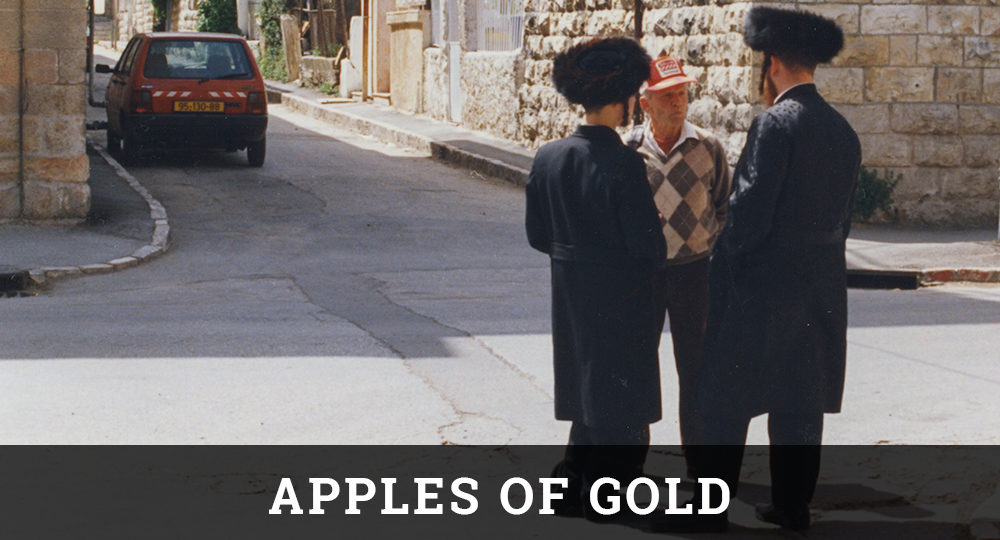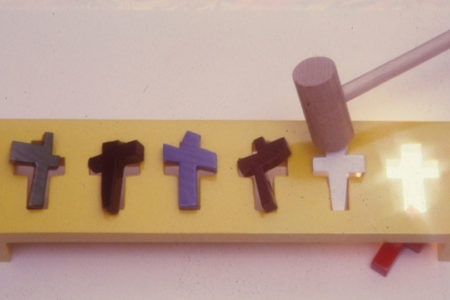Joel of Jerusalem Apr/May 1990
I recently met an old friend and learned that he had been very ill and in the hospital for quite a while. I could tell just by looking at him that he was not a healthy man, and he told me that he has to return to the hospital frequently for blood tests. The doctor told him, “It is a pity you didn’t come to us long ago. But don’t worry, well do our best to save you. Of course, we cannot be sure what will happen.” I asked, “What do you think about the situation? Can this doctor save you?” He replied, “I am no more sure than the doctor.” I told him, “The Lord would never say, ‘I am not sure what will happen to you.’ He has said, ‘Come unto me … and ye shall find rest unto your souls’ (Mt. 11:28–29).”
I then related my experience a few years ago when I suffered a massive heart attack while walking on the street in Jerusalem. “The doctor did not say, ‘Everything will be fine.’ Instead he told my family, ‘There is no hope for him.’ But you can see that I am still alive, and I can say with Job, ‘I know that my redeemer liveth’ (Job 19:25). Because my God lives, I am sure that I will never die, and I can again say with Job, ‘though after my skin worms destroy this body, yet in my flesh shall I see God’ (Job 19:26).”
“How can you be so sure of yourself?” my friend asked. “I am not sure of myself,” I replied, “but I am sure of God and His promises to His children. It is written in Ecclesiastes 12:7, ‘Then shall the dust return to the earth as it was, and the spirit shall return unto God, who gave it.’ If you put your trust in the Lord, you can be sure of your eternal destiny. If, on the other hand, you put your trust in the doctor, you have no guarantee that your body or your soul will be saved.”
He said, “I have heard many Christians say the same things you just said. Are you a Christian instead of a Jew?” I then read Psalm 23 and asked, “Did a Christian write that beautiful Psalm? And what about Amos’ statement, ‘prepare to meet thy God, O Israel’ (Amos 4:12), or Ezekiel’s statement, ‘the soul that sinneth, it shall die’ (Ezek. 18:4)? Were these words written by Christians?”
These passages of Scripture were strange to my friend because he is not a religious person, and this may have been the first time in his life he had a serious discussion about spiritual matters. But there must always be a beginning. What’s more, it was surprising to him that a person such as I, without a hat or side curls, would speak to him about faith. He had always associated spiritual things with orthodox Jews and said, “I don’t understand why you, of all people, are telling me these things.” Then he grew very serious and said, “I know I don’t have much time left to spend on this earth, so I really don’t care what happens anymore. What will be, will be.” I responded, “I am surprised to hear you say that. There are billions of people in the world, and most are very concerned about what will happen to them when they die.”
I had to spend a long time with this man before I could direct the conversation to the subject of faith in Christ. But I have learned over the years that if you start quickly, you will finish even more quickly. I always remember the words of 2 Timothy 2:24, “the servant of the Lord must … be … patient,” especially with one such as my friend who knows that his time on earth is very short.
Several times during our long conversation he told me, “Regardless of what anyone says, only the grave awaits me, and that very soon. There is no hope left for me. I will not live much longer, so why do you want me to think about it?”
I asked if he believed what is written in the Bible. He replied, “As a Jew, I must believe the Bible.” I then read Isaiah 26:19, “Thy dead men shall live, together with my dead body shall they arise.” This was a hard concept for my friend to accept, and he said, “I don’t know how to answer you. Perhaps neither one of us is normal!” Again I asked if he believed the Bible. “Yes!” he replied, seeming rather annoyed. I then read Amos 5:4, “For thus saith the LORD unto the house of Israel, Seek ye me, and ye shall live.” I continued, “Surely you have seen people in synagogues praying for everlasting life. They are not praying that their bodies will last forever. Everyone knows that the human body lasts only a short time on earth in comparison to eternity. It is the same as the thousands of tourists we see everyday in Israel; they come and they go. The human body is here, and then it is gone. But the same is not true of the soul, which is eternal. We must, therefore, do what the Lord expects of us during our brief sojourn on earth so that we may one day say, ‘Father, into thy hands I commend my spirit’ (Lk. 23:46), and be sure that He will accept us.”
At this point in our conversation we fell into a long discussion about the end of our physical lives, and he asked, “When you had your heart attack and were on your deathbed, what were you thinking about?” I answered, “I certainly was not thinking about my end because I know that I am not lost. Solomon said, ‘man goeth to his long home’ (Eccl. 12:5). I can assure you that I have seen death before my very eyes so many times that I could not count them, but I have never been submissive to it because my song has always been, ‘Behold, God is my salvation; I will trust, and not be afraid’ (Isa. 12:2). With this hope I have lived for 60 long years, and my trust is still in Him. And now you see me—with a joyful face and full of confidence for the future—and you see yourself—with a gloomy countenance and full of anger. Truly, which way would you rather be?” He finally admitted, “There may be something to this. I hope you will tell me more some day.”
Please pray with me that I will have further opportunities to share the Lord Jesus Christ with this man and that he will see his need of the Savior and accept Him as his Messiah before he passes out of this life and into the next.








